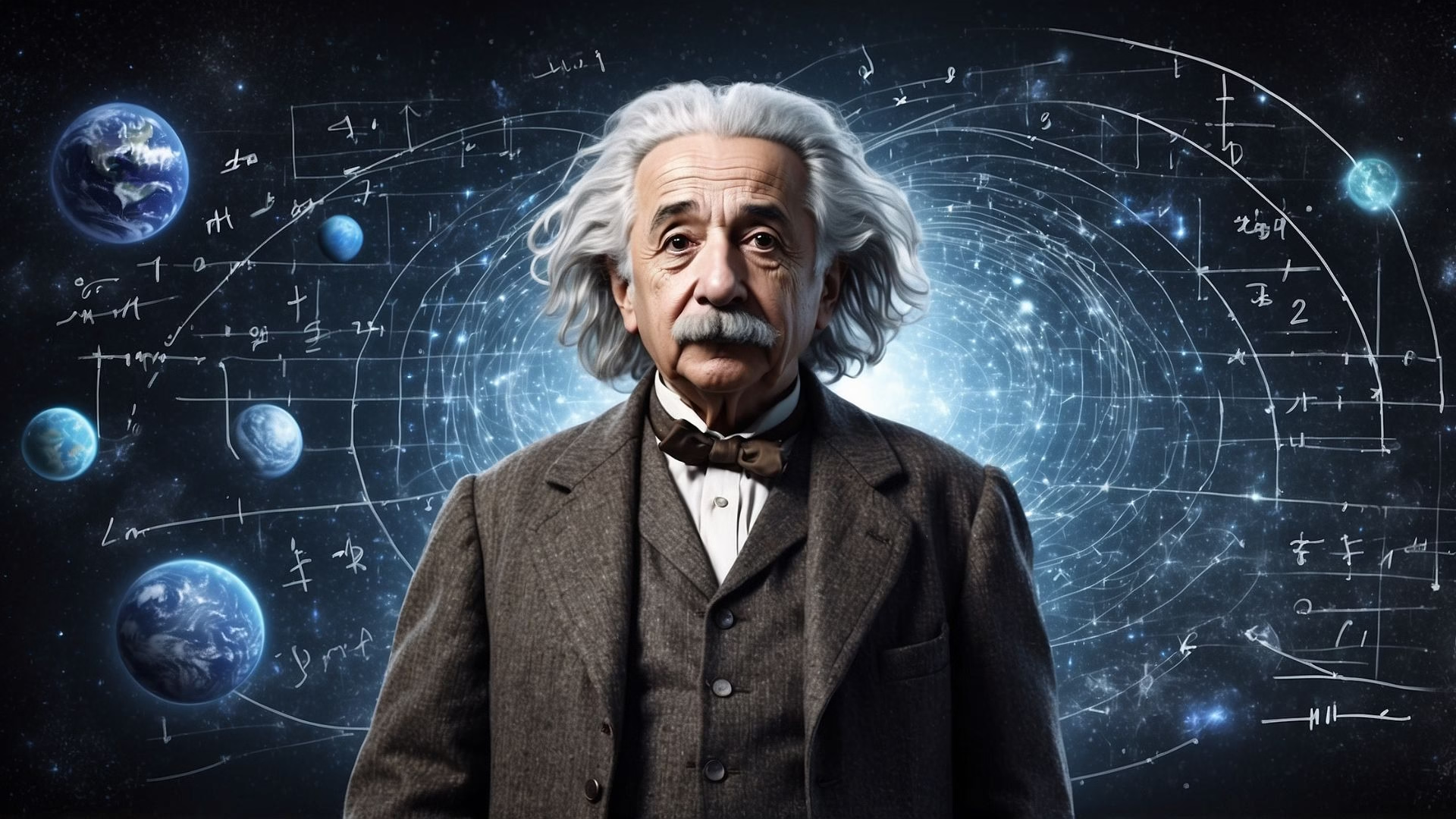- What Is the Theory of Relativity?
- Why Is the Speed of Light Constant in Special Relativity?
- What Is Time Dilation?
- How Does Gravity Work in General Relativity?
- Can the Theory of Relativity Be Applied in Everyday Life?
- What Are Black Holes and How Do They Relate to Relativity?
- Does the Theory of Relativity Contradict Newtonian Physics?
- How Was the Theory of Relativity Proven?
- Why Is the Theory of Relativity Important?
- Can Anyone Understand the Theory of Relativity?
- Let’s Talk
- Let’s Learn Vocabulary in Context
- Let’s Discuss & Write
The theory of relativity, developed by Albert Einstein, is one of the most groundbreaking concepts in modern physics. While its name is familiar to many, the details often seem complex and mysterious. What exactly does the theory of relativity mean? How does it affect our understanding of the universe? Let’s dive into the answers to some of the most frequently asked questions about the theory of relativity.
What Is the Theory of Relativity?
The theory of relativity is a scientific framework proposed by Albert Einstein that revolutionized how we understand space, time, and gravity. It consists of two key components:
- Special Relativity (1905): Focuses on the relationship between space and time in the absence of gravity. It introduced concepts like the constancy of the speed of light and time dilation.
- General Relativity (1915): Expands on special relativity by incorporating gravity as the warping of spacetime caused by massive objects.
In simpler terms, the theory explains how objects behave and interact in the universe, especially when moving at high speeds or in the presence of strong gravitational fields.
Why Is the Speed of Light Constant in Special Relativity?
In special relativity, Einstein postulated that the speed of light (approximately 299,792 kilometers per second) is the same for all observers, regardless of their motion or the motion of the light source. This idea challenges our everyday experiences but has been confirmed by numerous experiments.
This constancy is crucial because it provides a universal foundation for measuring time and space. Without it, the laws of physics wouldn’t be consistent across different frames of reference.
What Is Time Dilation?
Time dilation is one of the most famous consequences of special relativity. It means that time passes more slowly for an observer moving at a high speed compared to someone at rest.
For example, astronauts traveling close to the speed of light would age more slowly than people on Earth. This effect has been observed in experiments involving high-speed particles and is also factored into the operation of GPS satellites.
How Does Gravity Work in General Relativity?
In general relativity, gravity is not a force pulling objects together, as Newton described. Instead, it’s the curvature of spacetime caused by massive objects. Imagine a heavy ball placed on a trampoline—the trampoline’s surface curves, and smaller balls roll toward the heavy one.
Similarly, planets orbit the sun because spacetime curves around the sun’s massive presence. This explanation has been confirmed through phenomena like the bending of light around stars and the precise orbits of planets.
Can the Theory of Relativity Be Applied in Everyday Life?
Yes, the theory of relativity has practical applications in everyday life. For instance:
- GPS Technology: GPS satellites orbiting Earth experience both time dilation (special relativity) and gravitational effects (general relativity). These corrections ensure accurate location data.
- Particle Accelerators: High-speed particles in accelerators follow the principles of relativity to study fundamental physics.
- Astronomy and Space Exploration: Relativity helps scientists calculate the trajectories of spacecraft and understand phenomena like black holes.
What Are Black Holes and How Do They Relate to Relativity?
Black holes are regions of space with extremely strong gravitational fields, so intense that nothing, not even light, can escape. General relativity predicts their existence as a result of spacetime curvature caused by collapsing massive stars.
Observations like gravitational waves—ripples in spacetime caused by merging black holes—have further confirmed the theory’s accuracy.
Does the Theory of Relativity Contradict Newtonian Physics?
Not exactly. Newtonian physics works well for everyday situations involving low speeds and weak gravitational fields. Relativity refines these ideas and provides a more comprehensive framework for extreme conditions, like near the speed of light or in strong gravitational fields.
In essence, Newton’s laws are a special case of relativity, applying when speeds are much slower than light.
How Was the Theory of Relativity Proven?
The theory has been tested and confirmed in many ways:
- In 1919, the bending of starlight during a solar eclipse matched Einstein’s predictions.
- Time dilation has been observed with atomic clocks on fast-moving jets.
- The detection of gravitational waves in 2015 provided direct evidence for general relativity’s predictions.
Why Is the Theory of Relativity Important?
The theory of relativity fundamentally changed how we view the universe. It unified space and time into a single concept—spacetime—and redefined our understanding of gravity. Beyond its theoretical importance, it has practical applications that impact technology, astronomy, and even our philosophical understanding of reality.
Can Anyone Understand the Theory of Relativity?
While the mathematical details can be complex, the core ideas of relativity are accessible with clear explanations and examples. It’s about challenging our everyday perceptions and embracing a broader view of the universe.
Books, documentaries, and online resources simplify these concepts, making it easier for anyone curious to dive in.
The theory of relativity is more than just a scientific breakthrough—it’s a testament to human curiosity and ingenuity. By addressing questions about time, space, and gravity, it reshaped our understanding of the universe and continues to influence science and technology. Whether you’re marveling at GPS accuracy or pondering the mysteries of black holes, the principles of relativity are all around us. Hopefully, this FAQ has helped demystify this fascinating topic and sparked your curiosity to explore it further.
Let’s Talk
The theory of relativity is one of those concepts that can make your brain do somersaults if you think about it too much. But isn’t it fascinating how it changes the way we understand time, space, and gravity? The part that always gets me is time dilation. Imagine going on a space trip near the speed of light and coming back to find out that decades have passed on Earth while you’ve only aged a few years. It’s like being in a science fiction movie, but it’s real! How does that idea make you feel? Excited, or maybe a little uneasy?
One thing we didn’t touch on earlier is how the theory of relativity forces us to question our perception of reality. For instance, what even is time? We think of it as this constant, ticking away evenly for everyone, but relativity tells us that it’s flexible, depending on how fast you’re moving or how close you are to a massive object. It’s like time has its own personality—it bends, slows down, and sometimes even seems to take a detour. Can you think of moments in your life when time felt faster or slower? Maybe a thrilling experience zipped by, or waiting for news felt like an eternity.
And let’s not forget gravity. The idea that it’s not a force but the warping of spacetime is so different from what we grew up learning. Picture spacetime as a giant trampoline and the planets as balls making it dip and curve. It’s such a simple analogy, yet it explains so much. Do you ever wonder how Einstein came up with this? Was he staring at a trampoline or watching an apple fall, like Newton? Or was it pure imagination paired with brilliant math?
What about black holes? They’re like the rock stars of general relativity, bending spacetime so intensely that not even light can escape. If you’ve ever stared at the night sky and thought about what’s out there, black holes are both fascinating and terrifying. They challenge us to think about what happens when spacetime breaks all the rules. Do they destroy information forever, or does it somehow survive? This is still an open question that even top physicists are grappling with.
The theory of relativity also sneaks into our everyday lives in ways we don’t often think about. Take GPS. Without corrections for time dilation and spacetime curvature, those little devices in our pockets would be wildly inaccurate. Isn’t it amazing that something so mind-bendingly complex makes such a practical difference in our day-to-day lives? It makes you wonder—what other seemingly “out there” ideas could end up being essential to how we live?
So, next time you think about Einstein’s work, don’t just picture him scribbling equations on a chalkboard. Think about how his ideas ripple through everything, from the way we navigate our world to the way we understand our place in the universe. What part of relativity do you find the most intriguing, and how do you think it shapes the way we see reality?
Let’s Learn Vocabulary in Context
Let’s start with “theory of relativity.” It’s a term we hear often, but it’s more than just a scientific concept. A theory, in science, is a well-substantiated explanation of natural phenomena, and relativity is all about how things like time and space change based on movement and gravity. You might not use the full phrase in daily life, but you could say, “That idea about time zones changing how people perceive time reminds me of the theory of relativity.”
Next is “spacetime,” which combines space and time into one interwoven concept. Instead of thinking of them as separate, spacetime treats them as a fabric that can bend and curve. In everyday language, you might not use spacetime directly, but you could joke about how your hectic schedule feels like it’s warping spacetime.
The word “dilation” comes up in time dilation, and it simply means expansion or stretching. In a non-scientific sense, you could say, “The dilation of the deadline gave us more time to finish the project.”
“Warping” is another important term, describing the bending or distorting of spacetime. You could use it metaphorically, like, “That new thriller movie warped my sense of reality!”
“Gravity” is a familiar term, but it takes on a new meaning in relativity. Instead of pulling objects, it curves spacetime. You might still use it in the everyday sense, saying, “Gravity makes climbing stairs feel like a workout.”
Then there’s “velocity,” which refers to the speed of something in a given direction. It’s often used in physics, but in casual settings, you might say, “The velocity of that decision surprised everyone in the meeting.”
“Phenomena” is a term for observable events or facts. In science, it could mean natural occurrences like black holes, but in daily life, you might use it to describe something awe-inspiring, like, “The Northern Lights are one of the most breathtaking phenomena I’ve ever seen.”
“Black holes” are another captivating term. These massive spacetime distortions capture our imagination. While you might not discuss black holes daily, you could use it humorously: “The internet is a black hole for my free time.”
“Time dilation” is a fascinating phrase that describes how time slows down at high speeds. You could use it metaphorically, like, “Every time I’m stuck in traffic, I feel like I’m experiencing time dilation.”
Finally, “Einstein’s postulates” refers to the foundational ideas of relativity, like the constancy of the speed of light. While this might not come up directly, you could say, “That’s a postulate we can all agree on!” to emphasize a universal truth.
Now, think about this: How many of these words or phrases can you see yourself using, even in creative ways? Have you ever experienced a moment where time or space felt like they were bending to your will—or completely against it?
Let’s Discuss & Write
Discussion Questions:
- Which aspect of the theory of relativity fascinates you the most, and why?
- How do you think your perception of time and space changes after learning about relativity?
- Do you find it exciting or unsettling that time can slow down or speed up depending on circumstances?
- How do practical applications of relativity, like GPS, shape the way we interact with technology?
- What questions about the universe or reality do Einstein’s theories inspire you to explore further?
Writing Prompt:
Write a short piece titled “Living in a Warped World” where you imagine a day in a reality where the effects of relativity—like time dilation or curved spacetime—are part of everyday life. How would it change your interactions, routines, or decisions? Keep it creative yet grounded in the concepts you’ve learned. Aim for 300–400 words and try to incorporate at least three key vocabulary words from the topic.










0 Comments